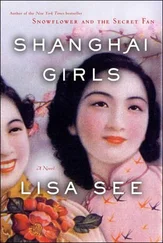Lisa See - Peony in Love
Здесь есть возможность читать онлайн «Lisa See - Peony in Love» весь текст электронной книги совершенно бесплатно (целиком полную версию без сокращений). В некоторых случаях можно слушать аудио, скачать через торрент в формате fb2 и присутствует краткое содержание. Жанр: Старинная литература, на английском языке. Описание произведения, (предисловие) а так же отзывы посетителей доступны на портале библиотеки ЛибКат.
- Название:Peony in Love
- Автор:
- Жанр:
- Год:неизвестен
- ISBN:нет данных
- Рейтинг книги:4 / 5. Голосов: 1
-
Избранное:Добавить в избранное
- Отзывы:
-
Ваша оценка:
- 80
- 1
- 2
- 3
- 4
- 5
Peony in Love: краткое содержание, описание и аннотация
Предлагаем к чтению аннотацию, описание, краткое содержание или предисловие (зависит от того, что написал сам автор книги «Peony in Love»). Если вы не нашли необходимую информацию о книге — напишите в комментариях, мы постараемся отыскать её.
Peony in Love — читать онлайн бесплатно полную книгу (весь текст) целиком
Ниже представлен текст книги, разбитый по страницам. Система сохранения места последней прочитанной страницы, позволяет с удобством читать онлайн бесплатно книгу «Peony in Love», без необходимости каждый раз заново искать на чём Вы остановились. Поставьте закладку, и сможете в любой момент перейти на страницу, на которой закончили чтение.
Интервал:
Закладка:

al s o by l i sa se e
Snow Flower and the Secret Fan
Dragon Bones
The Interior
Flower Net
On Gold Mountain
Peony in Love
This book has been optimized for viewing
at a monitor setting of 1024 x 768 pixels.


gggggggggggggggggggggggggggggg
Peony in Love
a n o v e l
Lisa See
a
R A N D O M H O U S E
N E W Y O R K
gggggggggggggggggggggg
Peony in Love is a work of historical fiction. Apart from some actual people, events, and locales that figure in the narrative, all names, characters, places, and incidents are the products of the author’s imagination or are used fictitiously.
Copyright © 2007 by Lisa See
All rights reserved.
Published in the United States by Random House, an imprint of The Random House Publishing Group, a division of Random House, Inc., New York.
Random House and colophon are registered trademarks of Random House, Inc.
Indiana University Press: Excerpts from The Peony Pavilion (Mudan ting) by Tang Xianzu, translated by Cyril Birch (Bloomington: Indiana University Press, 1980), copyright © 1980 by Cyril Birch.
Reprinted by permission of Indiana University Press.
Stanford University Press: Excerpts from Teachers of the Inner Chambers: Women and Culture in Seventeenth-Century China by Dorothy Ko, copyright © 1994 by the Board of Trustees of the Leland Stanford Jr. University. All rights reserved. Reprinted by permission of Stanford University Press, www.sup.org.
Library of Congrees Cataloging-in-Publication Data See, Lisa.
Peony in love: a novel/Lisa See.
p.
cm.
eISBN: 978-1-58836-623-8
1. Women—China—Fiction. 2. Opera—Fiction. 3. China—
History—Ming dynasty, 1368–1644—Fiction. I. Title.
PS3569.E3334P46 2007
813'.54—dc22
2007001623
www.atrandom.com
Book design by Victoria Wong
v1.0
FOR BOB LOOMIS,
in celebration of his fifty years
at Random House
th e m i ng dy nasty f e l l i n 164 4 and the qing dynasty, le d by the Manchus, began. For about thirty years, the country was in turmoil.
Some women were forced from their homes; others went out by choice.
Literally thousands of women became published poets and writers. The lovesick maidens were a part of this phenomenon. The works of more than twenty of them have survived to today.
I have followed the traditional Chinese style for rendering dates. Emperor Kangxi reigned from 1662 to 1722. Tang Xianzu’s opera The Peony Pavilion was first produced and then published in 1598. Chen Tong (Peony in this novel) was born ca. 1649, Tan Ze ca. 1656, and Qian Yi ca. 1671. In 1694, The Three Wives’ Commentary became the first book of its kind to be written and published by women anywhere in the world.
Love is of source unknown, yet it grows ever deeper. The living may die of it, by its power the dead live again. Love is not love at its fullest if one who lives is unwilling to die for it, or if it cannot restore to life one who has died. And must love that comes in dream necessarily be unreal? For there is no lack of dream lovers in this world. Only for those whose love must be fulfilled on the pillow, and for whom affection deepens only after retirement from office, is it an entirely corporeal matter.
—Preface to The Peony Pavilion
tang xianzu, 1598


gggggggggggggggggggg
p a r t i
In the Garden
ggggggggggggggggggg

Riding the Wind
two days b e f ore my s i xte e nth b i rth day, i woke up so early that my maid was still asleep on the floor at the foot of my bed. I should have scolded Willow, but I didn’t because I wanted a few moments alone to savor my excitement. Beginning tonight, I would attend a production of The Peony Pavilion mounted in our garden.
I loved this opera and had collected eleven of the thirteen printed versions available. I liked to lie in bed and read of the maiden Liniang and her dream lover, their adventures, and their ultimate triumph. But for three nights, culminating on Double Seven—the seventh day of the seventh month, the day of the lovers’ festival, and my birthday—I would actually see the opera, which was normally forbidden to girls and women. My father had invited other families for the festivities. We’d have contests and banquets. It was going to be amazing.
Willow sat up and rubbed her eyes. When she saw me staring at her, she scrambled to her feet and offered good wishes. I felt another flutter of anticipation, so I was particular when Willow bathed me, helped me into a gown of lavender silk, and brushed my hair. I wanted to look perfect; I wanted to act perfectly.
A girl on the edge of sixteen knows how pretty she is, and as I looked in the mirror I burned with the knowledge. My hair was black and silky.
When Willow brushed it, I felt the strokes from the top of my head all the way down my back. My eyes were shaped like bamboo leaves; my brows were like gentle brushstrokes limned by a calligrapher. My cheeks glowed ( 3 )
the pale pink of a peony petal. My father and mother liked to comment on how appropriate this was, because my name was Peony. I tried, as only a young girl can, to live up to the delicateness of my name. My lips were full and soft. My waist was small and my breasts were ready for a husband’s touch. I wouldn’t say I was vain. I was just a typical fifteen-year-old girl. I was secure in my beauty but had enough wisdom to know it was only fleeting.
My parents adored me and made sure I was educated—highly educated. I lived a rarefied and precious existence, in which I arranged flowers, looked pretty, and sang for my parents’ entertainment. I was so privileged that even my maid had bound feet. As a small girl, I believed that all the gatherings we held and all the treats we ate during Double Seven were a celebration for me. No one corrected my mistake, because I was loved and very, very spoiled. I took a breath and let it out slowly—
happy. This would be my last birthday at home before I married out, and I was going to enjoy every minute.
I left my room in the Unmarried Girls’ Hall and headed in the direction of our ancestral hall to make offerings to my grandmother. I’d spent so much time getting ready that I made a quick obeisance. I didn’t want to be late for breakfast. My feet couldn’t take me as fast as I wanted to go, but when I saw my parents sitting together in a pavilion overlooking the garden, I slowed. If Mama was late, I could be late too.
“Unmarried girls should not be seen in public,” I heard my mother say.
“I’m even concerned for my sisters-in-law. You know I don’t encourage private excursions. Now to bring outsiders in for this performance . . .”
Читать дальшеИнтервал:
Закладка:
Похожие книги на «Peony in Love»
Представляем Вашему вниманию похожие книги на «Peony in Love» списком для выбора. Мы отобрали схожую по названию и смыслу литературу в надежде предоставить читателям больше вариантов отыскать новые, интересные, ещё непрочитанные произведения.
Обсуждение, отзывы о книге «Peony in Love» и просто собственные мнения читателей. Оставьте ваши комментарии, напишите, что Вы думаете о произведении, его смысле или главных героях. Укажите что конкретно понравилось, а что нет, и почему Вы так считаете.












